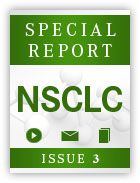Angiogenesis Biomarkers Show Potential for Predicting PFS and OS in NSCLC
A handful of angiogenesis biomarkers predicted improved progression-free survival (PFS) and overall survival (OS) in patients with nonsquamous non-small cell lung cancer (NSCLC) treated with bevacizumab.
A handful of angiogenesis biomarkers predicted improved progression-free survival (PFS) and overall survival (OS) in patients with nonsquamous non-small cell lung cancer (NSCLC) treated with bevacizumab, according to results of a small clinical study.
Rising levels of interleukin (IL)-8 and vascular endothelial growth factor (VEGF)-A had significant associations with PFS and OS with chemotherapy plus bevacizumab versus chemotherapy alone. The same markers, plus rising levels of leptin, were associated with improved survival in patients who received chemotherapy plus bevacizumab, as reported at the ASCO Annual Meeting in Chicago, Illinois.
Bilal Piperdi, MD, onRICTORAmplification in Lung Cancer
Piperdi is a professor at Albert Einstein College of Medicine.
“The significant relationships we observed in our relatively small groups of patients suggest that further evaluation of angiogenic biomarkers in longitudinal studies is warranted to substantiate the monitoring of patients with serum biomarkers,” said Marta Batus, PhD, of Rush University Medical Center in Chicago.
“We are planning to further evaluate the samples of patients with non-small cell lung cancer for different angiogenic biomarkers, correlate with clinical outcomes, and hopefully in the future, we will be able to predict which treatment will benefit patients the mostjust by drawing their blood and identifying certain biomarkers,” she added.
Identification of biomarkers associated with favorable or unfavorable outcomes could inform clinical decision making and lead to more efficient and cost-effective use of costly therapy.
“The principal objective of this study was to evaluate the predictive value of a panel of circulating biomarkers important in cancer-induced angiogenesis in the front-line treatment of non-small cell lung cancer patients,” said Batus.
Investigators analyzed serum samples of 41 patients with nonsquamous NSCLC treated in first line with chemotherapy alone or chemotherapy plus bevacizumab. The two groups of patients were balanced with respect to age, sex, and other clinical and demographic factors. Patients who received bevacizumab in addition to chemotherapy had a median PFS of 237 days compared with 135 days for patients treated with chemotherapy alone. Median OS was 619 days with bevacizumab and 245 days without it. Serum samples were evaluated for a panel of angiogenesis growth factors: angiopoietin-2; BMP-9; EGF; endoglin; endothelin-1; FGF-1; FGF-2; follistatin; G-CSF; HB-EGF; HGF; IL-8; leptin; PLGF; VEGF-A; VEGF-C; and VEGF-D. Batus and colleagues compared serum levels of each biomarker before and after systemic therapy. Changes in concentrations of different biomarkers were compared with PFS and OS, and interaction analysis was performed to assess treatment effect on biomarker levels.
The analysis showed that increasing levels of VEGF-A in the first cycle of treatment with chemotherapy plus bevacizumab were associated with significantly worse PFS (HR 4.98;P<.001). Increasing levels of IL-8 were associated with significantly better PFS and OS in patients treated with chemotherapy and bevacizumab (HR 0.00;P= .003; HR 0.02;P= .02). Higher levels of leptin were associated with improved OS in patients who received chemotherapy plus bevacizumab (HR 0.36;P= .02).
Batus M, Pithadia R, Kubasiak J, et al. Differences in circulating angiogenic biomarkers as prognosticator for outcome in bevacizumab-treated nonsquamous non-small cell lung cancer (NSCLC) patients.J Clin Oncol
